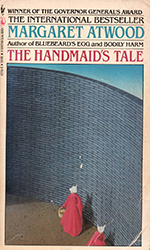 It should come as no surprise to anyone who has known me for very long or who follows me on social media but, despite having read nine of her books, I actually don’t like Margaret Atwood’s work very much.[ref]At least, not her fiction. I do tend to enjoy her non-fiction.[/ref] I continue to read her books mostly out of a sense of professional obligation. I am therefore both pleased and surprised to report that I found The Handmaid’s Tale to be absolutely riveting. There are some books—and I usually try to avoid making statements like this, because most of the time they’re bullshit[ref]Likely including now.[/ref]—that have an ineffable quality that separates them from other books; they are in some way the real deal, and The Handmaid’s Tale is one of them. I don’t know that I would have felt that way if I’d read it earlier. Certainly my point of view has changed as I’ve gotten older,[ref]Not something that’s worth getting into here.[/ref] but since November the world has taken a giant step backwards. What might have seen absurdly far-fetched to me years ago seems dangerously close today.
It should come as no surprise to anyone who has known me for very long or who follows me on social media but, despite having read nine of her books, I actually don’t like Margaret Atwood’s work very much.[ref]At least, not her fiction. I do tend to enjoy her non-fiction.[/ref] I continue to read her books mostly out of a sense of professional obligation. I am therefore both pleased and surprised to report that I found The Handmaid’s Tale to be absolutely riveting. There are some books—and I usually try to avoid making statements like this, because most of the time they’re bullshit[ref]Likely including now.[/ref]—that have an ineffable quality that separates them from other books; they are in some way the real deal, and The Handmaid’s Tale is one of them. I don’t know that I would have felt that way if I’d read it earlier. Certainly my point of view has changed as I’ve gotten older,[ref]Not something that’s worth getting into here.[/ref] but since November the world has taken a giant step backwards. What might have seen absurdly far-fetched to me years ago seems dangerously close today.
The Handmaid’s Tale has the same problems as most of Atwood’s other fiction; the prose is sloppy and repetitive, and Atwood’s science-fictional detail work and naming conventions are tiresome rather than clever, like that one uncle at holiday dinners who’s been telling the same jokes for thirty years like nobody has ever heard them before. Her character work is phenomenal, however, and I believed deeply in Offred’s fear and in how close she came to internalizing Gilead’s social structure as “normal” despite the intense oppression she experienced. The Handmaid’s Tale works best when Atwood stays away from the high-level discussions of Gilead’s oppressive social structures and instead focuses on how those oppressive structures warp people and relationships. Not that Atwood ever lets individuals off the hook. Gilead’s social structures didn’t emerge from thin air; like various theocracies and dictatorships throughout history, it’s a directed society given its shape by identifiable individuals. This is likely another reason I may be more receptive to The Handmaid’s Tale now than I might have been had I read it earlier; because while our own society is not shaped by identifiable individuals to the same degree that Gilead is, we are currently experiencing a cultural moment where we are being forced to confront our culpability with regard to what social pressures are enacted, and how, particularly around gender issues.[ref]Basically I mean that we, and men in particular, are finally starting to listen to the women who have been saying for generations that we need to not be such assholes to them.[/ref]
I can’t say for sure that this will make me pick up more of Atwood’s fiction for reasons beyond professional obligation—as I said above, all the structural and technical issues that cause me to dislike her work are all present in The Handmaid’s Tale[ref]Except for the stuff in Lady Oracle that was borderline racist. None of that here.[/ref]—but I wouldn’t say it’s impossible.